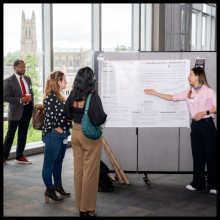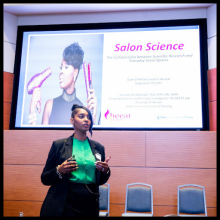The Duke Center for AIDS Research (CFAR) is part of a network of NIH-funded CFARs across the nation. The principal mission of the Duke CFAR is to provide scientific leadership as well as establish, enrich, and provide continued infrastructure support to an academic research environment that will effectively promote collaboration and coordination among the community of HIV/AIDS investigators at Duke. Learn more about the services and support available to researchers at Duke through our scientific Cores.
Have news to share? Submit information for the newsletter and website.

CFAR AIT Core Fosters Generations of Mentorship and Discovery
This graduation season, the Duke CFAR celebrates two outstanding scholars whose paths have been shaped and connected through the Advanced Immunotechnology (AIT) Core. Grant Williams, a Duke undergraduate who graduated with distinction, and Danielle Nettere, a trainee who graduated with her MD/PhD degrees, are at different stages in their careers but both embody the spirit of scientific curiosity, dedication, and mentorship that the AIT Core has cultivated across generations. These are just two of the many stories from trainees who have benefited from their interactions with AIT investigators and their teams, helping to shape future generations of scientists.

Kathy Link recognized with Research Support Excellence Award
Congratulations to Kathy Link for being recognized with the Department of Medicine’s Research Support Excellence Award!
The Research Support Award recognizes sustained excellence in the administrative and programmatic support of research studies in the Department of Medicine. These staff members help to manage complex regulatory thickets, navigate byzantine internal systems, balance competing priorities, create order from chaos, connect team members, identify latent creative solutions, and ultimately enhance the rigor and the feasibility of research projects in the Department of Medicine.


